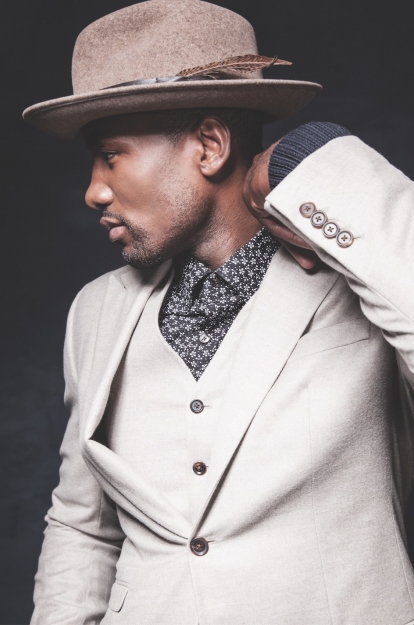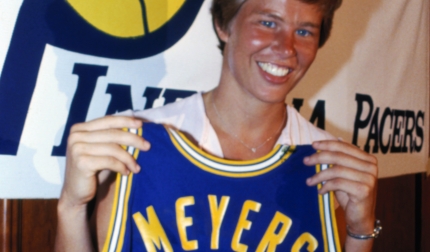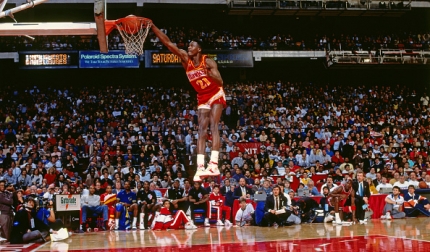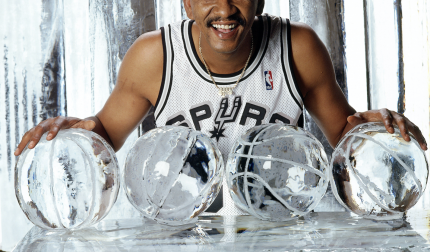If you don’t know much about Serge Jonas Ibaka Ngobila (or Serge Ibaka to basketball fans around the world), there is good reason. Ever since Ibaka entered the NBA in 2009, the star center of the Oklahoma City Thunder was reticent to share his personal journey from being a homeless young man to an NBA superstar. As a child, playing in the NBA seemed a far away dream. Being born against the backdrop of a civil war in the Republic of Congo, the dream of survival was at times even more distant.
Now entering his seventh year in the league, Ibaka has begun to open up about his unique path to the pros in America. And by telling the world about the obstacles he’s overcome, he hopes to give kids around the world the one gift he received as a child—hope. “It’s hard for me to tell my story,” Ibaka says. “I had to put my ego down to let people in. It takes a lot of effort to let your ego go and share this kind of story with the world, but it’s a story that I hope is good for young people. Big things always come from small beginnings. And good things always come from the hardest beginnings.”
Ibaka’s beginning came as a child in Brazzaville, the capital of the Republic of Congo, a country mired in over 150 years of civil war. It was there that Ibaka would listen to what he calls “the music,” the perpetual percussion of rifle fire and exploding mortars that filled the air with smoke and noise. The bombs and bullets of the war became the soundtrack of his childhood. From the violence of war to the poverty of being unable to get medicine, death was a daily part of life in the Congo.
For Ibaka, basketball was a welcome distraction from a life of poverty. It wasn’t unusual for there to be an absence of electricity, food and even shoes at times. “I would wake up at 4 a.m. and I would run,” he says. “And when I would return, we often would not have anything to eat. None of it was easy.”
The one blessing that Ibaka did have bestowed upon him was two amazing and genetically gifted parents. Mom played for the women’s national basketball team of the Democratic Republic of Congo, traveling the world to compete against other great women players. Ibaka’s dad, Desiré played for the Republic of Congo men’s team. Dad’s basketball prowess as a professional made him a local legend long before his famous son was born.

Blazer, Calvin Klein; Sweater, Lacoste; Shirt and Tie, Prada
Ibaka’s mom died when he was only seven years old. Thankfully, he lived with a father whose faith in him never wavered. “Since I was six years old, my dad thought I would be a great basketball player,” Ibaka says. “Every day, he would always tell his friends, ‘Did you see my son today? My future big man?’ He always believed in me.”
When Ibaka was 10 years old, his dad, who worked on the ports of Brazzaville and Kinshasa, was arrested and placed in jail. He was suspected of being an anti-government rebel. Desiré Ibaka would spend the next two years of his life in prison without ever having been charged of a crime.
Without his parents, Ibaka went to live with his grandmother (his mother’s mother), until he was 12. After having a disagreement with his uncles who lived in the house, the uncles threw Ibaka out of the house and would physically attack him whenever he tried to return. At age 12, Ibaka was alone and adrift, often sleeping in cars on good nights, making a few dollars by cleaning the city streets or painting.
When Ibaka was able to reunite with his dad, basketball began to grow in his life. At age 16, he joined his neighborhood team, Avenir du Rail. Soon, he was one of the country’s most promising stars. At age 17, Ibaka traveled to the US to take part in the Adidas Nations basketball camp as part of the African team. Soon, NBA scouts were calling on him. By the time he was 18, he was a first round pick in the NBA Draft.
Ibaka has thrived as a professional, joining Kevin Durant and Russell Westbrook as cornerstones of the next great NBA team in Oklahoma City. There, he has led the NBA in blocked shots, while his offensive game has improved dramatically.

Jacket, Calvin Klein; Sweater, Lacoste; Jeans, Ibaka’s own
Each summer offseason, Ibaka returns to the Republic of Congo to visit his extensive family. His most recent trip was documented in a short film for Grantland title Son of the Congo. In the film, you see how Ibaka still financially cares for most of his family, including the same uncles who threw him out of the house as a child. The documentary also shows how Ibaka paid to have the basketball court near his home rebuilt—the very same court that he and his father once played on.
At the end of the film, Ibaka addresses a young kid who wants to be a basketball player, not only to reach the elite world of competition and salary, but to come give back to his family and the people of the Republic of Congo.
“These kids, when they see me, I hope they say to themselves, ‘He did it, so I can do it.’” Ibaka says. “I know they still don’t have a lot. I try to give as much as I can, but you can’t help everyone, no matter how hard you try. That’s why they need to dream. To dream big doesn’t cost anything. Dreaming big is free.”





